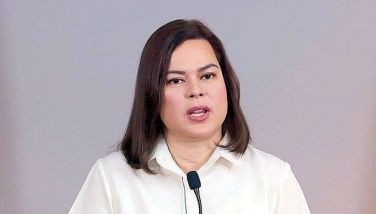I found myself immersed in very interesting panel discussions yesterday even if the topics were completely bereft of any talks on politics here and elsewhere. We attended yesterday the UNESCO Media breakfast forum hosted by Ambassador Preciosa Soliven at their family-owned restaurant La Dolce Fontana in Greenhills, San Juan City. Under the helm of Ambassador Soliven, the United Nations Educational Scientific and Cultural Organization (UNESCO), is one of the most active members of the UN Country Team in the Philippines.
I did not realize that the subject about Millennium Development Goals (MDG) could be that exciting if you have a panel of discussants of UN Country Team representatives here in the Philippines who are all experts in their respective fields. The panelists were led by UN resident coordinator and UN Development Programme (UNDP) resident representative Nileema Noble; UN Population Fund (UNFPA) country representative Suneeta Mukherjee; World Health Organization (WHO) country representative Dr. Soe Nyunt-U; World Food Programme (WFP) country director and representative Valerie Guarnieri; Food and Agriculture Organization (FAO) representative Kazuyuki Tsurumi; UN Children’s Fund (UNICEF) deputy representative Colin Davis, and International Labor Organization (ILO) sub-regional director Linda Wirth. UNDP deputy resident representative Kyo Naka joined us later during the open forum.
From their respective discussions, I learned a lot of substantial information regarding what these three letters MDG are all about. So what are the MDG that the UN and its country team agencies are pushing the Philippines to meet? These are to eradicate poverty and hunger, develop global partnership for development, ensure environmental sustainability, combat Acquired Immune Deficiency Syndrome (HIV/AIDS), malaria, and other diseases; achieve universal primary education, promote gender equality and empower women, reduce child mortality and improve maternal health.
To my pleasant surprise yesterday, the UNDP resident representative reported that the scorecard of the Philippines fared satisfactorily in complying with the MDG in 2007. The targets are time-bound for the MDGs and must be achieved by each country by the year 2015.
Ms. Noble cited that the Philippines in particular has been “on target” on the poverty reduction, nutrition, reducing child mortality, combating HIV/AIDS; and, access to safe drinking water and sanitary toilet facility. But from the reckoning of the UNDP for the same period, the Philippines is “off target” in the MDGs for universal access to education, maternal mortality and access to reproductive health services. The continuing challenges to the achievement of these MDGs by the Philippines, she pointed out, include the increasing income inequality among Filipinos where only 10 percent of families own one third of the total income in the country. She added as equally pressing challenges to achieving the MDGs in the Philippines are the financing gaps, high population growth rates, the conflict situation in Mindanao, global warming and climate change.
Couched in diplomatese, she cited also as challenge to the achievement of MDGs by the Philippines the “governance and accountability.” Without her elaborating on this score, I surmised she is referring to the efficiency of our government officials in making use of these official development assistance (ODAs) from the UN and other foreign donors, and the usual corruption that go into the implementation of these UN-assisted and ODA-funded MDG programs and projects.
What caught my complete attention was the report of the UNFPA lady country representative in discussing why the Philippines failed to meet the MDG target on maternal mortality. She raised the alarm that 4,600 Filipino women die giving birth each year. Of this number, more than 10 Filipino pregnant women die each day while giving birth, leaving their children motherless. Sadly, Ms. Mukherjee underscored 99 percent of these deaths are preventable if only they have access to reproductive health services.
Ms. Mukherjee also raised the alarm that in the Philippines, there are 3.1 million “unplanned” pregnancies and almost one third of that end up in abortions, thus making it one of the leading causes of maternal mortality in our country. She stressed anew that Filipinos, like any other couples in other countries, have the right to information and access to the right contraceptive method to use. Four Filipino babies are born every minute. Definitely, our country’s population growth is one of the most rapid one in this part of the world. She cautioned that achieving MDG targets could be more difficult if the Philippines do not address squarely the issue of controlling rapid population growth.
She realized, however, that the national leadership in the Philippines closely adheres to the Catholic stand against the use of artificial contraceptives as one of the means to address this rapid population growth problem. Thus, she pointed out, the UNFPA goes down to the level of local government units since the health services of the government, including the provision of reproductive health services, have been devolved. The governors and mayors, of course, follow their own respective policies on family planning. So whoever is in favor of the use of artificial birth contraceptives could avail of it. The UNFPA, she cited, has provided this year $1.7 million worth of contraceptives that include condoms, pills and injectibles that prevent pregnancy. So far, she disclosed, some 540 LGUs have availed of these birth control assistance from the UNFPA with local counterpart funding from them.
For the past three months that I have been acting as facilitator or moderator to this breakfast forum upon the request of Ambassador Soliven, it was only yesterday that we had the most number of discussants and yet we finished the entire topic within the period allotted. I noted with satisfaction that this was because our discussants, who are all foreigners, kept within their time limits in discussing their assigned topics. In the Philippines, talk is cheap. That is why most Filipino politicians who always promise us good life talk longer than they should. But action, rather than talk, is needed to achieve goals for a better life in our country.






























